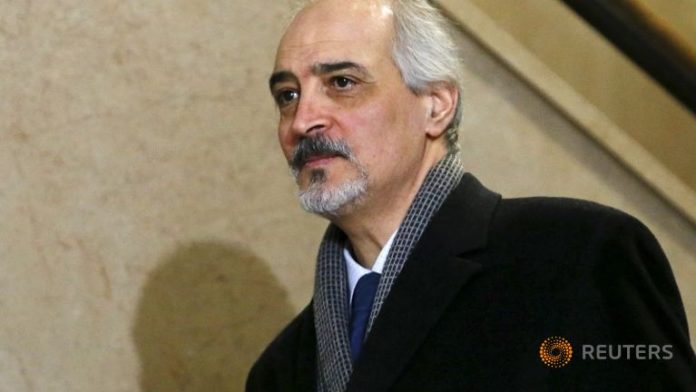
ABC Lateline’s Tony Jones spoke with Dr Bashar Jaafari, Syria’s ambassador to the UN in an interview that was published on Wednesday, while at the UN’s Syrian peace talks. Dr Jaafari is the Syrian government’s lead negotiator for the talks.
The interview began with a biting question; Jones asked if Syrian president Bashar al-Assad had the ability to stay on as Syrian president now that Russia was on its way out.
Jaafari was adamant that the government was quite capable of defending its interests without Russian support. He pointed out that Russia was only in Syria for a few months, and that the decision to withdraw was made jointly between Russian President Vladimir Putin and President Assad.
“Of course, definitely. We have been fighting the terrorists all over Syria for five years, as you know,” he said. “Before that, we were doing the – the Syrian Army was doing the most important part of the mission of combating terrorism…
“The Russian decision has not been a unilateral decision taken by Moscow at the detrimental of Damascus, as some media anchors try to say. This decision was taken jointly by both President Putin and President Assad.
“The main reason for that is to encourage the process of the national reconciliation process, to give a chance to the talks, indirect talks amongst Syrians in Geneva, but also to give a signal that the biggest part of the mission of combating terrorism has been fulfilled successfully.”
“Does your president still believe there is a military solution in Syria?” Jones asked.
“The military track aims at destroying the terrorist and combating the terrorism, the international terrorism, whether you call it jihadist or, you know, mercenaries or pure international terrorist networks. But definitely there is another track which is called the political track and this is why we are here in Geneva,” replied Jaafari.
The two debated over the definition of terrorism for a lengthy period.
Jones then asked if Assad would step aside from a proposed transitional government, or if he would be a part of it, or lead it. Jafaari retorted that the current peace negotiations did not call for Assad to step down.
“Resolution 2254 does not say anything about President Assad to be removed or to step down… what you have called Syrian national transitional body, we are not dealing with this kind of terminology anymore because in the 2254 we have the terminology of governance…
“We are ready to engage into the Syrian-Syrian talks without any foreign interference, without any preconditions or prerequisites…
“In Syria, you have a huge international war by proxies. The CIA has its proxies, the Pentagon has its proxies, the Israelis have their proxies, the Saudis, the Turks, the Qataris have their proxies, the French have their proxies and all kinds of these international mafia is fighting in Syria, killing the Syrian people for – in favour of foreign agendas. So it is not a Syrian-Syrian war. It is Syria fighting an international war by proxies on the Syrian soil.”
Then the interview takes an interesting turn.
Jones chooses to quote the head of the High Negotiations Committee Mohammed Alloush, to reiterate the opposition’s claim that Assad has to go before peace can be achieved, saying “the transitional period can only start after the fall of Bashar al-Assad or his death – or his death.”
Jaafari notes that “this guy you have just named – pronounce his name, is nothing but a terrorist. He’s shelling Damascus, he’s killing students at the university and he’s – he belongs to a terrorist faction called Jaysh al-Islam… So he is violating the Security Council resolutions en bloc, en bloc, and nobody is holding him responsible for what he is saying. By calling for the assassination… of a head of state.”
The National recently pointed out that “Jaish Al Islam’s former leader Zahran Alloush spoke of Alawites and Shiites in derogatory terms and at times advocated that they be cleansed from parts of Syria.” In November of last year, The New York Times reported that the rebel group had captured Alawite men, women and children and were using them as human shields to deter aerial bombardment. Rebel groups claim that they were captured officers and their family.
Zahran was killed by a Syrian government air strike.
Monstrous act by Saudi backed Zahran Alloush on Alowite captives, placed in cages to die from Assad’s attacks #Syria pic.twitter.com/Aks1fcctgt
— Rami Jarrah (@RamiJarrah) November 1, 2015
Jones continues to press his point; that Assad would want to take charge of the transitional government.
Jaafari responds that “the future of Syria should be decided by the Syrians themselves. This is what the resolution says: Syrian-led political process without any foreign interference and without any preconditions. Everybody should understand the meaning of this magic sentence in the Resolution 2254?”
Jones went on to point out that the concept of a civil war in Syria meant that many Syrians wanted to oust Assad. The ambassador then pointed out that WikiLeaks documents proved that the US had given the order to uproot the Syrian government. Jones then ignored the ambassador’s WikiLeaks argument and continued to press him about Assad maintaining power in Syria.
“The Syrian people will maintain him in power if the Syrian people wish to do so. It is not the business of foreigners to decide for the future of our president. It is a matter that is relevant to the – the will of the Syrian people, ” Jafaari replied.
Sources: UN, The National, Truth Out, New York Times
This article ([Video] Syrian Ambassador Quotes WikiLeaks, asserts the Syrian People, not “Foreigners,” will decide if Assad Stays) is a free and open source. You have permission to republish this article under a Creative Commons license with attribution to the author(CoNN) and AnonHQ.com.




